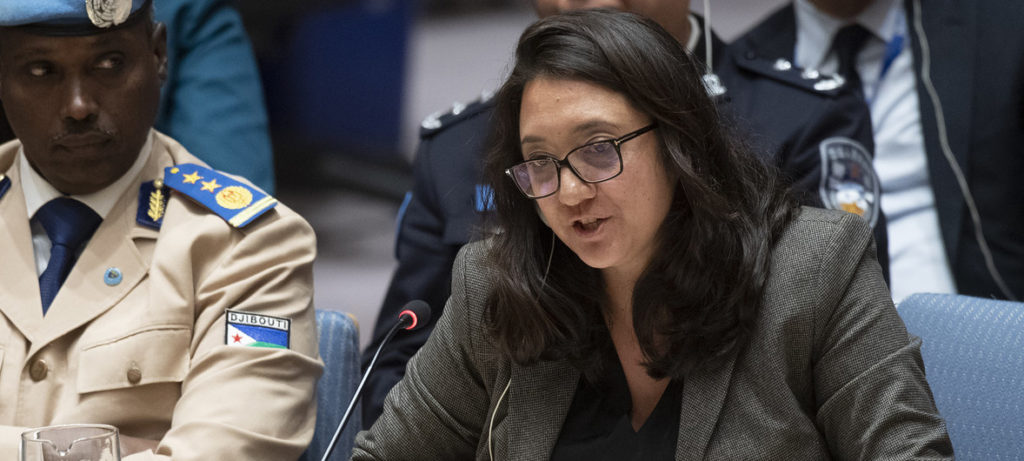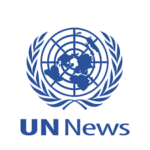International Crime Gangs Amass ‘Staggering’ Profits in Conflict Zones, Expert Tells Security Council
UNITED NATIONS, 12 Nov 2018
UN News – TRANSCEND Media Service
7 Nov 2018 – During yesterday’s briefing to the Security Council, Tuesday Reitano, Deputy Director of the Global Initiative Against Transnational Organized Crime, described the problem as a “global and accelerating phenomenon, and a threat to international peace and security,” that, in conflict areas alone, is generating around $31.5 billion in illicit profits.
Ms. Reitano’s address was delivered as part of the annual briefing by UN Peacekeeping operations, led by Alexander Zuev, Assistant Secretary-General for the Rule of Law, at the Department of Peacekeeping Operations (DPKO) and included presentations from UN Police Commissioners, on the work being carried out by Missions in South Sudan, the Democratic Republic of Congo (DRC) and Haiti.
Mr. Zuev said that the growing risks associated with organized crime – which he described as striking “at the heart of the United Nations’ core business”, have been recognized at the highest levels of the UN, including by Secretary-General António Guterres.
The link between conflict areas and organized crime was described by Ms. Reitano as undeniable: she added that the scale of money being illicitly generated by organized crime in these areas is “staggering.”
This phenomenon, said Ms. Reitano, is actually sustaining conflicts worldwide, with illegal exploitation and taxation of gold, oil and other natural resources overtaking traditional “threat finance” sectors, such as kidnapping for ransom and drug trafficking.

Tuesday Reitano, Global Initiative Against Transnational Organized Crime, addresses the Security Council meeting on United Nations peacekeeping operations. 6 November 2018. UN Photo/Eskinder Debebe
The actual combatants in conflict zones only receive a small fraction of illicit funds: “By far the larger share of the 31.5 billion dollars goes to political actors at all levels, and associated transnational criminal networks. These, therefore, are the main beneficiaries from instability, violence and lack of state capacity for enforcement, and who thus retain an interested in the perpetuation of conflict… Where crime thrives, there can be no sustainable peace”
Awale Abdounasir, UN Police Commissioner for the UN stabilization mission in the Democratic Republic of Congo (DRC) – known by its French acronym, MONUSCO, – also addressed the Security Council during the annual briefing session.
He explained that the police component of the Mission is assisting the DRC Government in combating organized crime by armed groups, with a mandate to work closely with the national Congolese police force to develop strategies for prevention, as well as the frontline fight.
Mr Abdounasir went on to say that governments of countries weakened by crises too often look to a military solution fighting crime syndicates, whereas strengthening of the judicial system by making it more transparent and rigorous would be a more appropriate strategy.
Ms. Reitano noted that UN police units are not sufficiently integrated with other areas of UN Missions, including political functions and other peacekeeping activities, and are significantly under-resourced.
Even if peace operations do not actively fight crime, she said, they need to be crime-sensitive: “the way in which criminal actors have become embedded in conflict zones suggests that policing must be a strategic consideration at all stages of a mission’s planning and deployment.”
She warned the Security Council that recent analysis carried out by partner organizations, including the Global Initiative Against Transnational Organized Crime and INTERPOL, shows links between illicit trafficking routes in conflict zones – in Africa, Asia, the Middle East and the Americas – and international terrorism, and concluded by stating the UN System needs a coherent, streamlined and strategic approach to addressing organized crime.
The Security Council briefing took place during the 2018 UN Police Week, from November 5 to 9, when UN Peacekeeping Operations and Special Political Missions come to New York to discuss strategic police priorities, including the UN Police contribution to the Secretary-General’s reform initiatives, including Action For Peacekeeping (A4P).
DISCLAIMER: The statements, views and opinions expressed in pieces republished here are solely those of the authors and do not necessarily represent those of TMS. In accordance with title 17 U.S.C. section 107, this material is distributed without profit to those who have expressed a prior interest in receiving the included information for research and educational purposes. TMS has no affiliation whatsoever with the originator of this article nor is TMS endorsed or sponsored by the originator. “GO TO ORIGINAL” links are provided as a convenience to our readers and allow for verification of authenticity. However, as originating pages are often updated by their originating host sites, the versions posted may not match the versions our readers view when clicking the “GO TO ORIGINAL” links. This site contains copyrighted material the use of which has not always been specifically authorized by the copyright owner. We are making such material available in our efforts to advance understanding of environmental, political, human rights, economic, democracy, scientific, and social justice issues, etc. We believe this constitutes a ‘fair use’ of any such copyrighted material as provided for in section 107 of the US Copyright Law. In accordance with Title 17 U.S.C. Section 107, the material on this site is distributed without profit to those who have expressed a prior interest in receiving the included information for research and educational purposes. For more information go to: http://www.law.cornell.edu/uscode/17/107.shtml. If you wish to use copyrighted material from this site for purposes of your own that go beyond ‘fair use’, you must obtain permission from the copyright owner.
